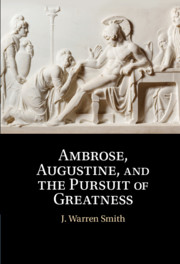Book contents
- Ambrose, Augustine, and the Pursuit of Greatness
- Ambrose, Augustine, and the Pursuit of Greatness
- Copyright page
- Dedication
- Contents
- Acknowledgments
- Abbreviations
- Introduction
- Part I The Problem of Greatness and the Great-Souled Man from Plato to Plutarch
- Part II Ambrose’s Great-Souled Christians
- 3 Ambrose
- 4 Toward a Higher Standard of Greatness
- 5 Humiliation without Shame or Resentment
- Part III Augustine and the Magnus Animus
- Epilogue
- Bibliography
- Index
3 - Ambrose
Law, Gospel, and Exemplary Patriarchs
from Part II - Ambrose’s Great-Souled Christians
Published online by Cambridge University Press: 24 November 2020
- Ambrose, Augustine, and the Pursuit of Greatness
- Ambrose, Augustine, and the Pursuit of Greatness
- Copyright page
- Dedication
- Contents
- Acknowledgments
- Abbreviations
- Introduction
- Part I The Problem of Greatness and the Great-Souled Man from Plato to Plutarch
- Part II Ambrose’s Great-Souled Christians
- 3 Ambrose
- 4 Toward a Higher Standard of Greatness
- 5 Humiliation without Shame or Resentment
- Part III Augustine and the Magnus Animus
- Epilogue
- Bibliography
- Index
Summary
When Hellenistic moralists, like Cicero and Plutarch, spoke about greatness of soul they employed an exemplarist pedagogy. The lives of great men were concrete instantiations of the ideal. Indeed, for Cicero the lives of great Romans preceded the ideal. Theory was dependent upon and therefore subordinate to biography. Ethics unpacked the logic of greatness embodied by the Scipiones and Cato the Younger. Ambrose’s depiction of Christian virtue in his catechetical homilies and ethical treatises was strongly influenced by the exemplarist conventions of these Classical and Hellenistic moralists.1 So, for example, Cicero’s ideal orator-statesman was the voice of Rome’s collective memory, the preserver of the mos maiorum, whose appeal to the lives of Rome’s patriarchs and matriarchs, both the virtuous and the vicious, preserved the ideal of Romanitas within the moral and political consciousness of society.2 Like Cicero, Ambrose’s thoroughly pragmatic Roman sensibilities disposed him to trust historical examples of virtue more than disembodied moral theory.3 But as a Christian, he views the Bible as the repository of the mos maiorum for Christian culture, and the patriarchs thereby become, as Marcia Colish felicitously puts it, “the new maiores.”4
- Type
- Chapter
- Information
- Ambrose, Augustine, and the Pursuit of Greatness , pp. 107 - 131Publisher: Cambridge University PressPrint publication year: 2020



